Leadership, Management Styles and Talent Management Analysis
VerifiedAdded on 2023/01/19
|17
|5707
|37
Report
AI Summary
This report analyzes leadership and management within the service industry, using Trailfinders, a British travel company, as a case study. It explores classical management theories like scientific, administrative, and bureaucracy theories, and various leadership styles including democratic, autocratic, and transactional approaches. The report examines the influence of internal and external factors on management styles and structures and assesses current and future leadership skills. It also provides a comparison between different service sectors, highlighting the importance of talent management in today's competitive landscape. The report emphasizes the need for service industries to adapt their management and leadership strategies to enhance employee creativity and performance, ultimately driving organizational success. The report covers the application of these theories and styles to facilitate talent management by providing proper guidance and motivation to employees to enhance their creativity and performance.
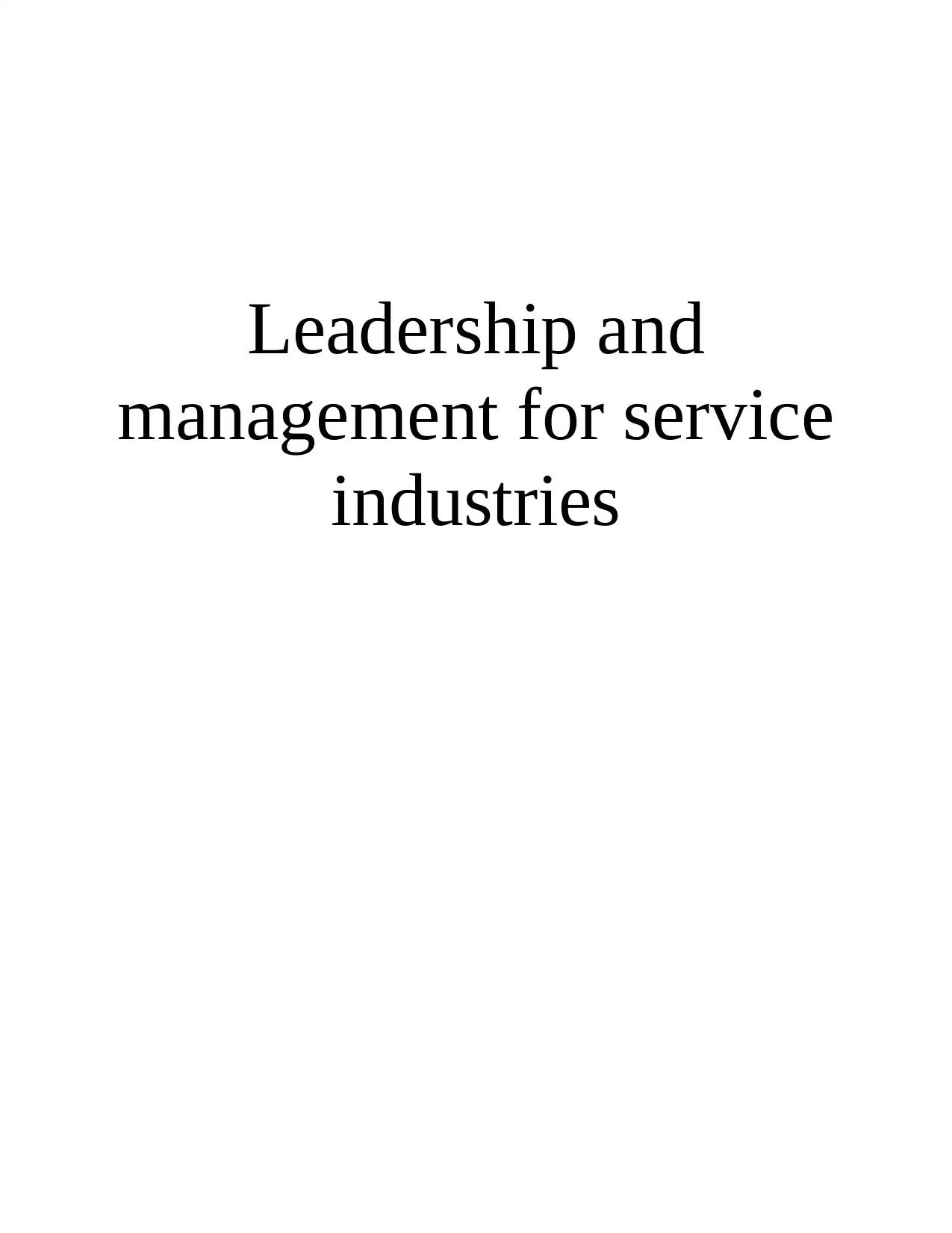
Leadership and
management for service
industries
management for service
industries
Paraphrase This Document
Need a fresh take? Get an instant paraphrase of this document with our AI Paraphraser
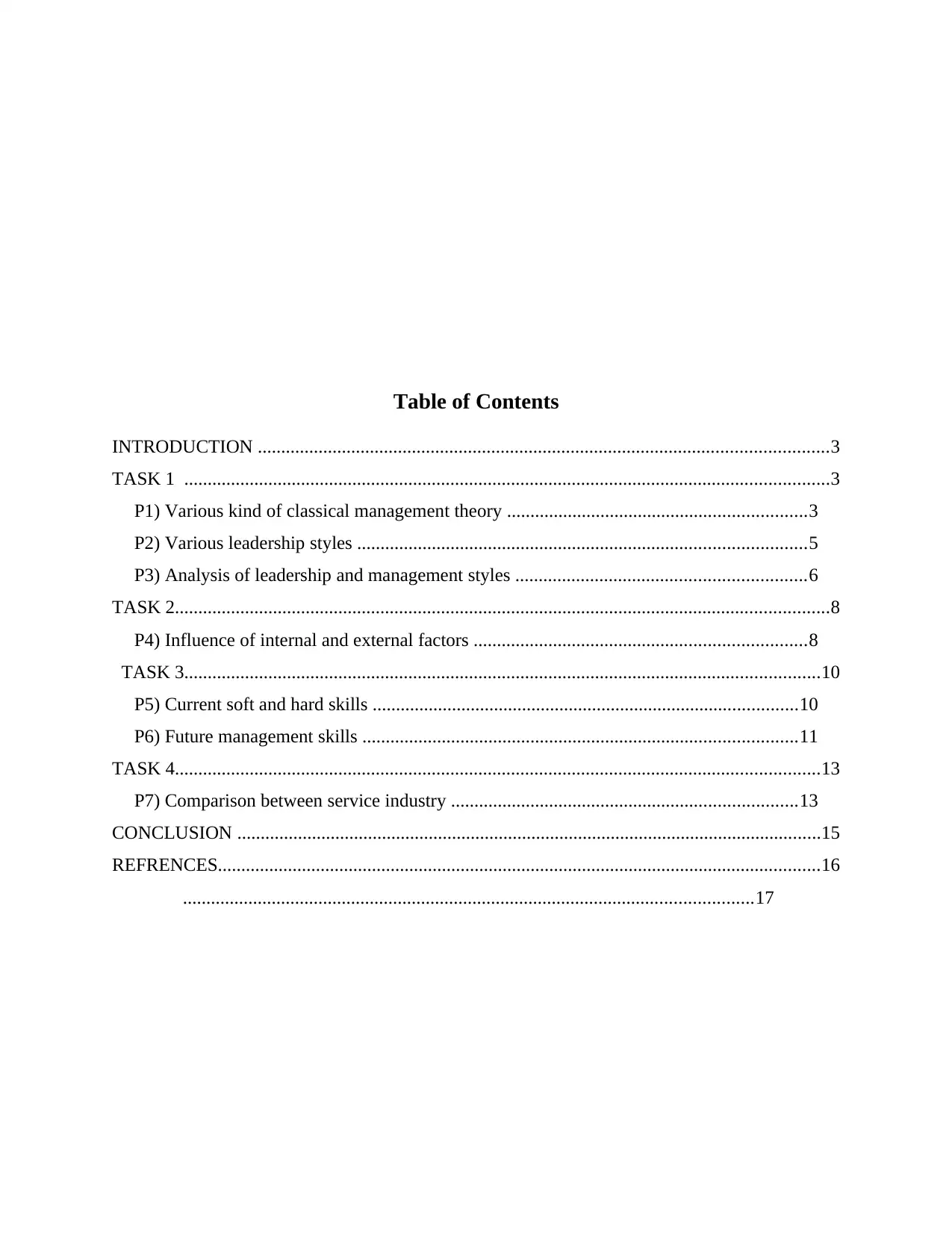
Table of Contents
INTRODUCTION ..........................................................................................................................3
TASK 1 ..........................................................................................................................................3
P1) Various kind of classical management theory ................................................................3
P2) Various leadership styles ................................................................................................5
P3) Analysis of leadership and management styles ..............................................................6
TASK 2............................................................................................................................................8
P4) Influence of internal and external factors .......................................................................8
TASK 3........................................................................................................................................10
P5) Current soft and hard skills ...........................................................................................10
P6) Future management skills .............................................................................................11
TASK 4..........................................................................................................................................13
P7) Comparison between service industry ..........................................................................13
CONCLUSION .............................................................................................................................15
REFRENCES.................................................................................................................................16
..........................................................................................................................17
INTRODUCTION ..........................................................................................................................3
TASK 1 ..........................................................................................................................................3
P1) Various kind of classical management theory ................................................................3
P2) Various leadership styles ................................................................................................5
P3) Analysis of leadership and management styles ..............................................................6
TASK 2............................................................................................................................................8
P4) Influence of internal and external factors .......................................................................8
TASK 3........................................................................................................................................10
P5) Current soft and hard skills ...........................................................................................10
P6) Future management skills .............................................................................................11
TASK 4..........................................................................................................................................13
P7) Comparison between service industry ..........................................................................13
CONCLUSION .............................................................................................................................15
REFRENCES.................................................................................................................................16
..........................................................................................................................17
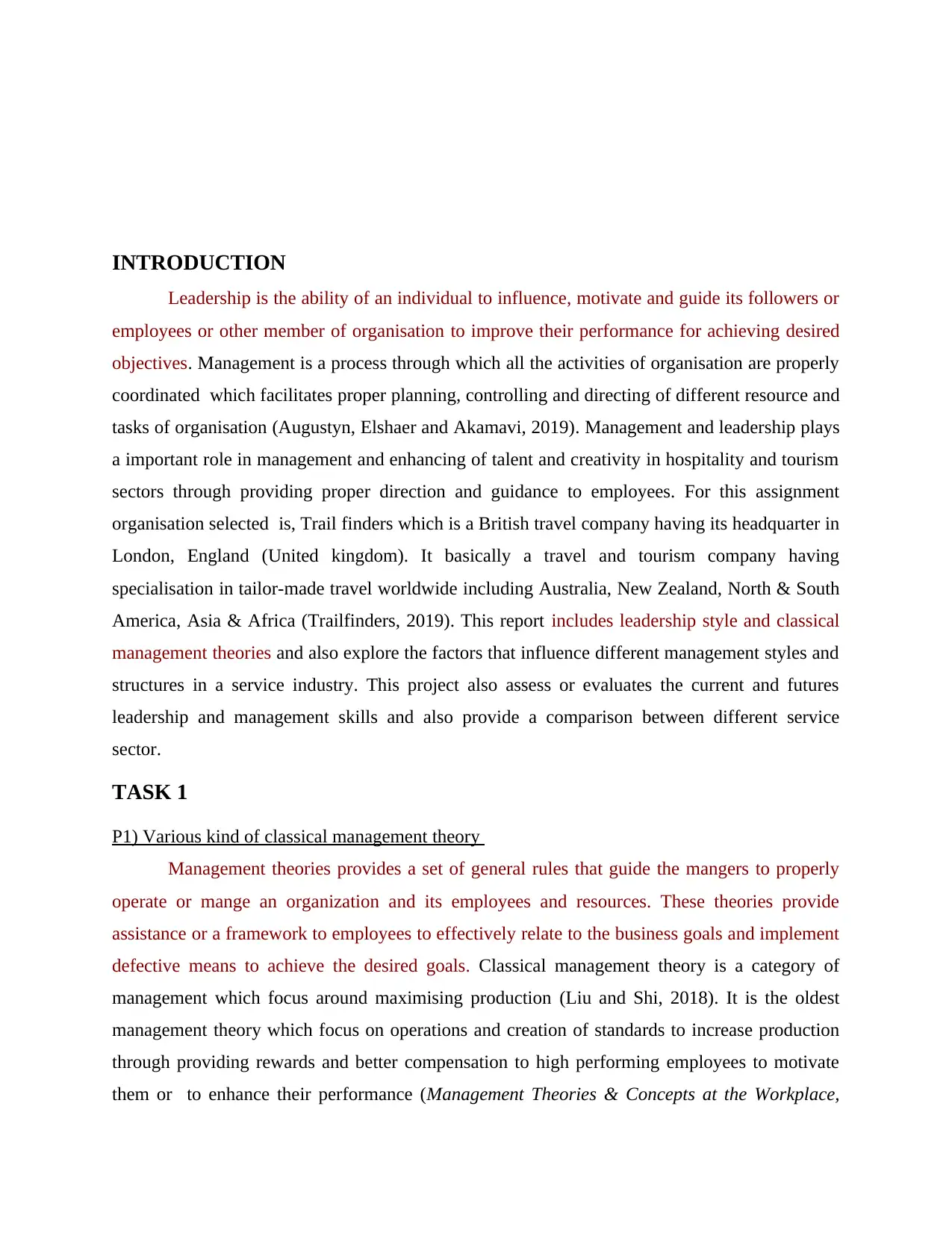
INTRODUCTION
Leadership is the ability of an individual to influence, motivate and guide its followers or
employees or other member of organisation to improve their performance for achieving desired
objectives. Management is a process through which all the activities of organisation are properly
coordinated which facilitates proper planning, controlling and directing of different resource and
tasks of organisation (Augustyn, Elshaer and Akamavi, 2019). Management and leadership plays
a important role in management and enhancing of talent and creativity in hospitality and tourism
sectors through providing proper direction and guidance to employees. For this assignment
organisation selected is, Trail finders which is a British travel company having its headquarter in
London, England (United kingdom). It basically a travel and tourism company having
specialisation in tailor-made travel worldwide including Australia, New Zealand, North & South
America, Asia & Africa (Trailfinders, 2019). This report includes leadership style and classical
management theories and also explore the factors that influence different management styles and
structures in a service industry. This project also assess or evaluates the current and futures
leadership and management skills and also provide a comparison between different service
sector.
TASK 1
P1) Various kind of classical management theory
Management theories provides a set of general rules that guide the mangers to properly
operate or mange an organization and its employees and resources. These theories provide
assistance or a framework to employees to effectively relate to the business goals and implement
defective means to achieve the desired goals. Classical management theory is a category of
management which focus around maximising production (Liu and Shi, 2018). It is the oldest
management theory which focus on operations and creation of standards to increase production
through providing rewards and better compensation to high performing employees to motivate
them or to enhance their performance (Management Theories & Concepts at the Workplace,
Leadership is the ability of an individual to influence, motivate and guide its followers or
employees or other member of organisation to improve their performance for achieving desired
objectives. Management is a process through which all the activities of organisation are properly
coordinated which facilitates proper planning, controlling and directing of different resource and
tasks of organisation (Augustyn, Elshaer and Akamavi, 2019). Management and leadership plays
a important role in management and enhancing of talent and creativity in hospitality and tourism
sectors through providing proper direction and guidance to employees. For this assignment
organisation selected is, Trail finders which is a British travel company having its headquarter in
London, England (United kingdom). It basically a travel and tourism company having
specialisation in tailor-made travel worldwide including Australia, New Zealand, North & South
America, Asia & Africa (Trailfinders, 2019). This report includes leadership style and classical
management theories and also explore the factors that influence different management styles and
structures in a service industry. This project also assess or evaluates the current and futures
leadership and management skills and also provide a comparison between different service
sector.
TASK 1
P1) Various kind of classical management theory
Management theories provides a set of general rules that guide the mangers to properly
operate or mange an organization and its employees and resources. These theories provide
assistance or a framework to employees to effectively relate to the business goals and implement
defective means to achieve the desired goals. Classical management theory is a category of
management which focus around maximising production (Liu and Shi, 2018). It is the oldest
management theory which focus on operations and creation of standards to increase production
through providing rewards and better compensation to high performing employees to motivate
them or to enhance their performance (Management Theories & Concepts at the Workplace,
⊘ This is a preview!⊘
Do you want full access?
Subscribe today to unlock all pages.

Trusted by 1+ million students worldwide
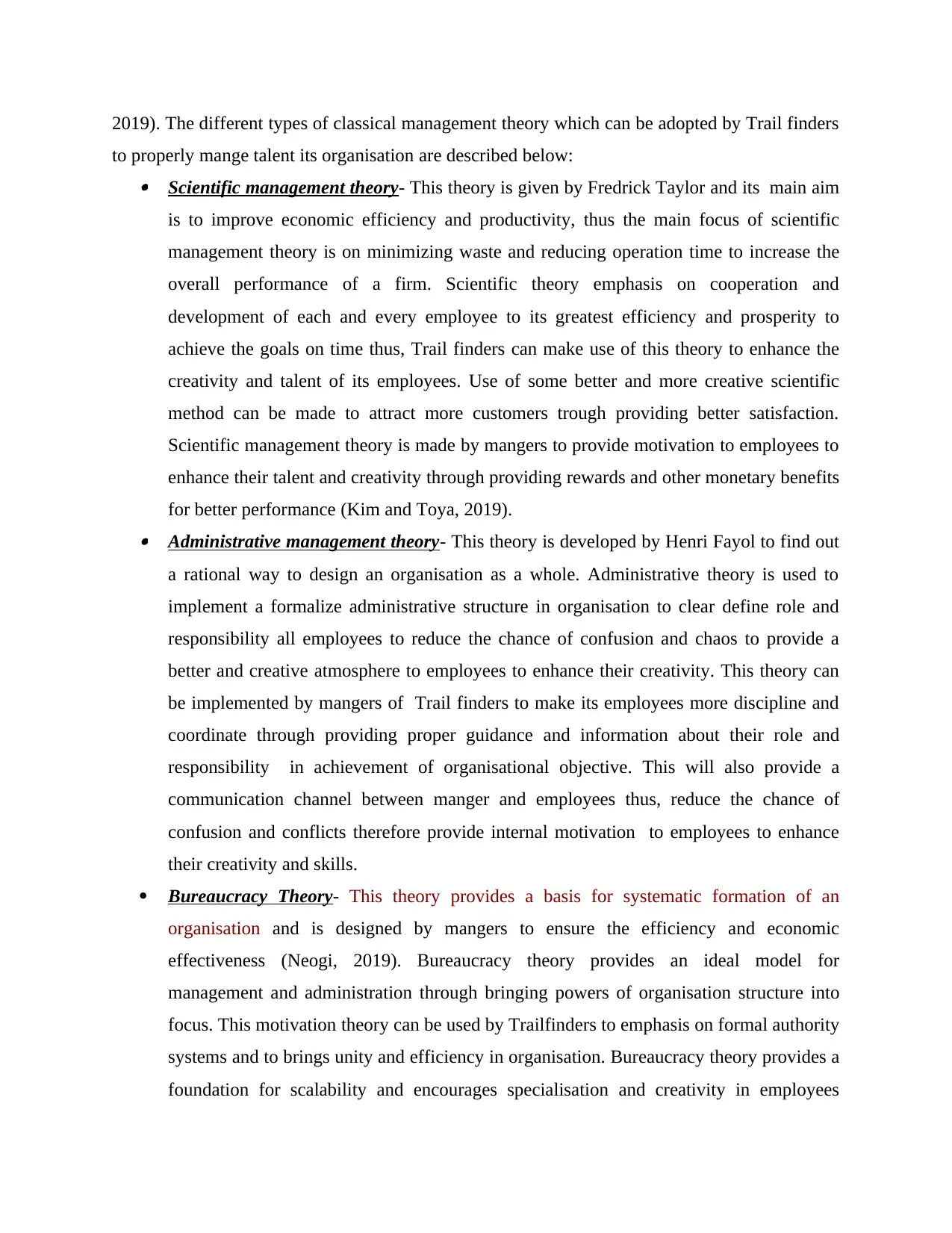
2019). The different types of classical management theory which can be adopted by Trail finders
to properly mange talent its organisation are described below: Scientific management theory- This theory is given by Fredrick Taylor and its main aim
is to improve economic efficiency and productivity, thus the main focus of scientific
management theory is on minimizing waste and reducing operation time to increase the
overall performance of a firm. Scientific theory emphasis on cooperation and
development of each and every employee to its greatest efficiency and prosperity to
achieve the goals on time thus, Trail finders can make use of this theory to enhance the
creativity and talent of its employees. Use of some better and more creative scientific
method can be made to attract more customers trough providing better satisfaction.
Scientific management theory is made by mangers to provide motivation to employees to
enhance their talent and creativity through providing rewards and other monetary benefits
for better performance (Kim and Toya, 2019). Administrative management theory- This theory is developed by Henri Fayol to find out
a rational way to design an organisation as a whole. Administrative theory is used to
implement a formalize administrative structure in organisation to clear define role and
responsibility all employees to reduce the chance of confusion and chaos to provide a
better and creative atmosphere to employees to enhance their creativity. This theory can
be implemented by mangers of Trail finders to make its employees more discipline and
coordinate through providing proper guidance and information about their role and
responsibility in achievement of organisational objective. This will also provide a
communication channel between manger and employees thus, reduce the chance of
confusion and conflicts therefore provide internal motivation to employees to enhance
their creativity and skills.
Bureaucracy Theory- This theory provides a basis for systematic formation of an
organisation and is designed by mangers to ensure the efficiency and economic
effectiveness (Neogi, 2019). Bureaucracy theory provides an ideal model for
management and administration through bringing powers of organisation structure into
focus. This motivation theory can be used by Trailfinders to emphasis on formal authority
systems and to brings unity and efficiency in organisation. Bureaucracy theory provides a
foundation for scalability and encourages specialisation and creativity in employees
to properly mange talent its organisation are described below: Scientific management theory- This theory is given by Fredrick Taylor and its main aim
is to improve economic efficiency and productivity, thus the main focus of scientific
management theory is on minimizing waste and reducing operation time to increase the
overall performance of a firm. Scientific theory emphasis on cooperation and
development of each and every employee to its greatest efficiency and prosperity to
achieve the goals on time thus, Trail finders can make use of this theory to enhance the
creativity and talent of its employees. Use of some better and more creative scientific
method can be made to attract more customers trough providing better satisfaction.
Scientific management theory is made by mangers to provide motivation to employees to
enhance their talent and creativity through providing rewards and other monetary benefits
for better performance (Kim and Toya, 2019). Administrative management theory- This theory is developed by Henri Fayol to find out
a rational way to design an organisation as a whole. Administrative theory is used to
implement a formalize administrative structure in organisation to clear define role and
responsibility all employees to reduce the chance of confusion and chaos to provide a
better and creative atmosphere to employees to enhance their creativity. This theory can
be implemented by mangers of Trail finders to make its employees more discipline and
coordinate through providing proper guidance and information about their role and
responsibility in achievement of organisational objective. This will also provide a
communication channel between manger and employees thus, reduce the chance of
confusion and conflicts therefore provide internal motivation to employees to enhance
their creativity and skills.
Bureaucracy Theory- This theory provides a basis for systematic formation of an
organisation and is designed by mangers to ensure the efficiency and economic
effectiveness (Neogi, 2019). Bureaucracy theory provides an ideal model for
management and administration through bringing powers of organisation structure into
focus. This motivation theory can be used by Trailfinders to emphasis on formal authority
systems and to brings unity and efficiency in organisation. Bureaucracy theory provides a
foundation for scalability and encourages specialisation and creativity in employees
Paraphrase This Document
Need a fresh take? Get an instant paraphrase of this document with our AI Paraphraser
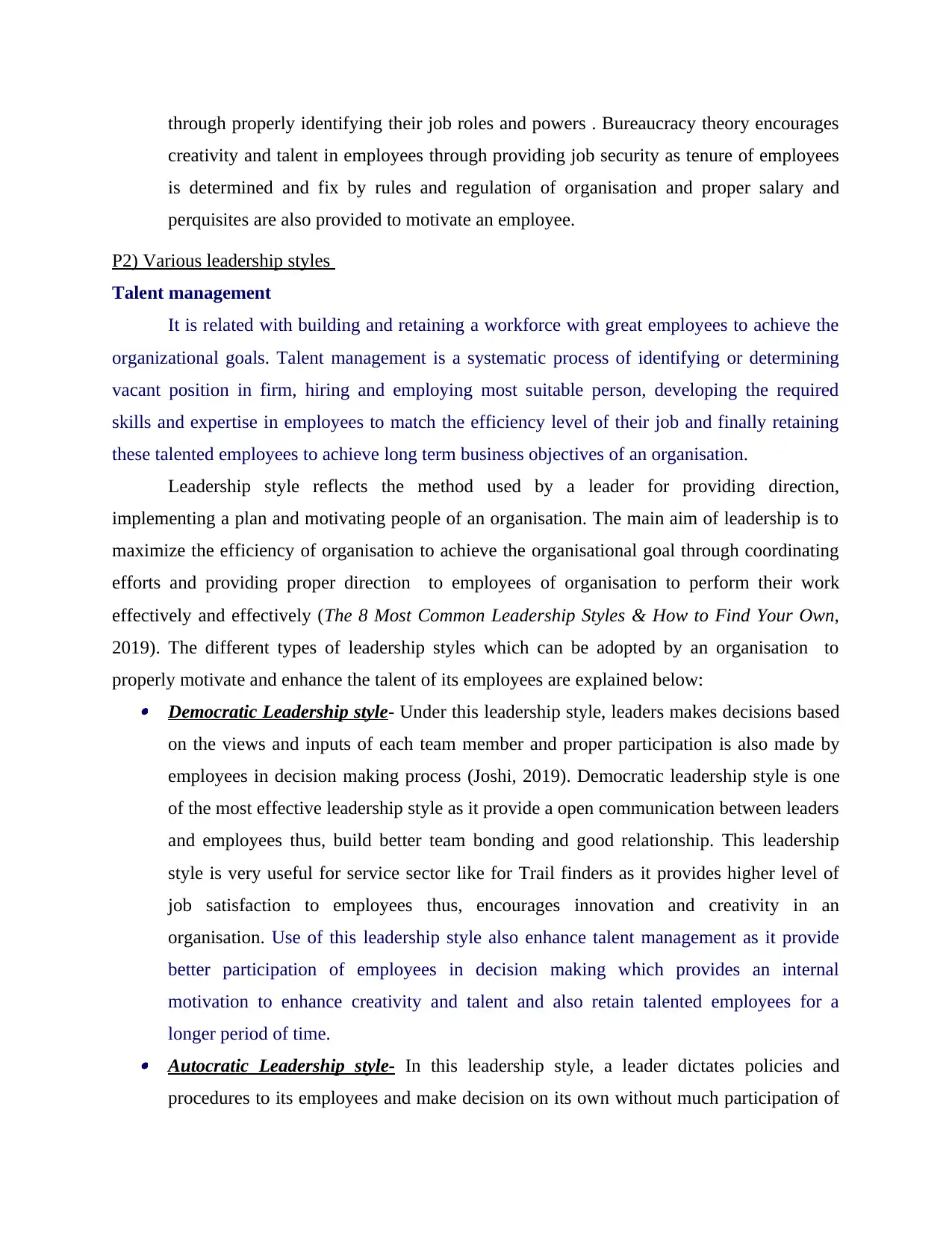
through properly identifying their job roles and powers . Bureaucracy theory encourages
creativity and talent in employees through providing job security as tenure of employees
is determined and fix by rules and regulation of organisation and proper salary and
perquisites are also provided to motivate an employee.
P2) Various leadership styles
Talent management
It is related with building and retaining a workforce with great employees to achieve the
organizational goals. Talent management is a systematic process of identifying or determining
vacant position in firm, hiring and employing most suitable person, developing the required
skills and expertise in employees to match the efficiency level of their job and finally retaining
these talented employees to achieve long term business objectives of an organisation.
Leadership style reflects the method used by a leader for providing direction,
implementing a plan and motivating people of an organisation. The main aim of leadership is to
maximize the efficiency of organisation to achieve the organisational goal through coordinating
efforts and providing proper direction to employees of organisation to perform their work
effectively and effectively (The 8 Most Common Leadership Styles & How to Find Your Own,
2019). The different types of leadership styles which can be adopted by an organisation to
properly motivate and enhance the talent of its employees are explained below: Democratic Leadership style- Under this leadership style, leaders makes decisions based
on the views and inputs of each team member and proper participation is also made by
employees in decision making process (Joshi, 2019). Democratic leadership style is one
of the most effective leadership style as it provide a open communication between leaders
and employees thus, build better team bonding and good relationship. This leadership
style is very useful for service sector like for Trail finders as it provides higher level of
job satisfaction to employees thus, encourages innovation and creativity in an
organisation. Use of this leadership style also enhance talent management as it provide
better participation of employees in decision making which provides an internal
motivation to enhance creativity and talent and also retain talented employees for a
longer period of time. Autocratic Leadership style- In this leadership style, a leader dictates policies and
procedures to its employees and make decision on its own without much participation of
creativity and talent in employees through providing job security as tenure of employees
is determined and fix by rules and regulation of organisation and proper salary and
perquisites are also provided to motivate an employee.
P2) Various leadership styles
Talent management
It is related with building and retaining a workforce with great employees to achieve the
organizational goals. Talent management is a systematic process of identifying or determining
vacant position in firm, hiring and employing most suitable person, developing the required
skills and expertise in employees to match the efficiency level of their job and finally retaining
these talented employees to achieve long term business objectives of an organisation.
Leadership style reflects the method used by a leader for providing direction,
implementing a plan and motivating people of an organisation. The main aim of leadership is to
maximize the efficiency of organisation to achieve the organisational goal through coordinating
efforts and providing proper direction to employees of organisation to perform their work
effectively and effectively (The 8 Most Common Leadership Styles & How to Find Your Own,
2019). The different types of leadership styles which can be adopted by an organisation to
properly motivate and enhance the talent of its employees are explained below: Democratic Leadership style- Under this leadership style, leaders makes decisions based
on the views and inputs of each team member and proper participation is also made by
employees in decision making process (Joshi, 2019). Democratic leadership style is one
of the most effective leadership style as it provide a open communication between leaders
and employees thus, build better team bonding and good relationship. This leadership
style is very useful for service sector like for Trail finders as it provides higher level of
job satisfaction to employees thus, encourages innovation and creativity in an
organisation. Use of this leadership style also enhance talent management as it provide
better participation of employees in decision making which provides an internal
motivation to enhance creativity and talent and also retain talented employees for a
longer period of time. Autocratic Leadership style- In this leadership style, a leader dictates policies and
procedures to its employees and make decision on its own without much participation of
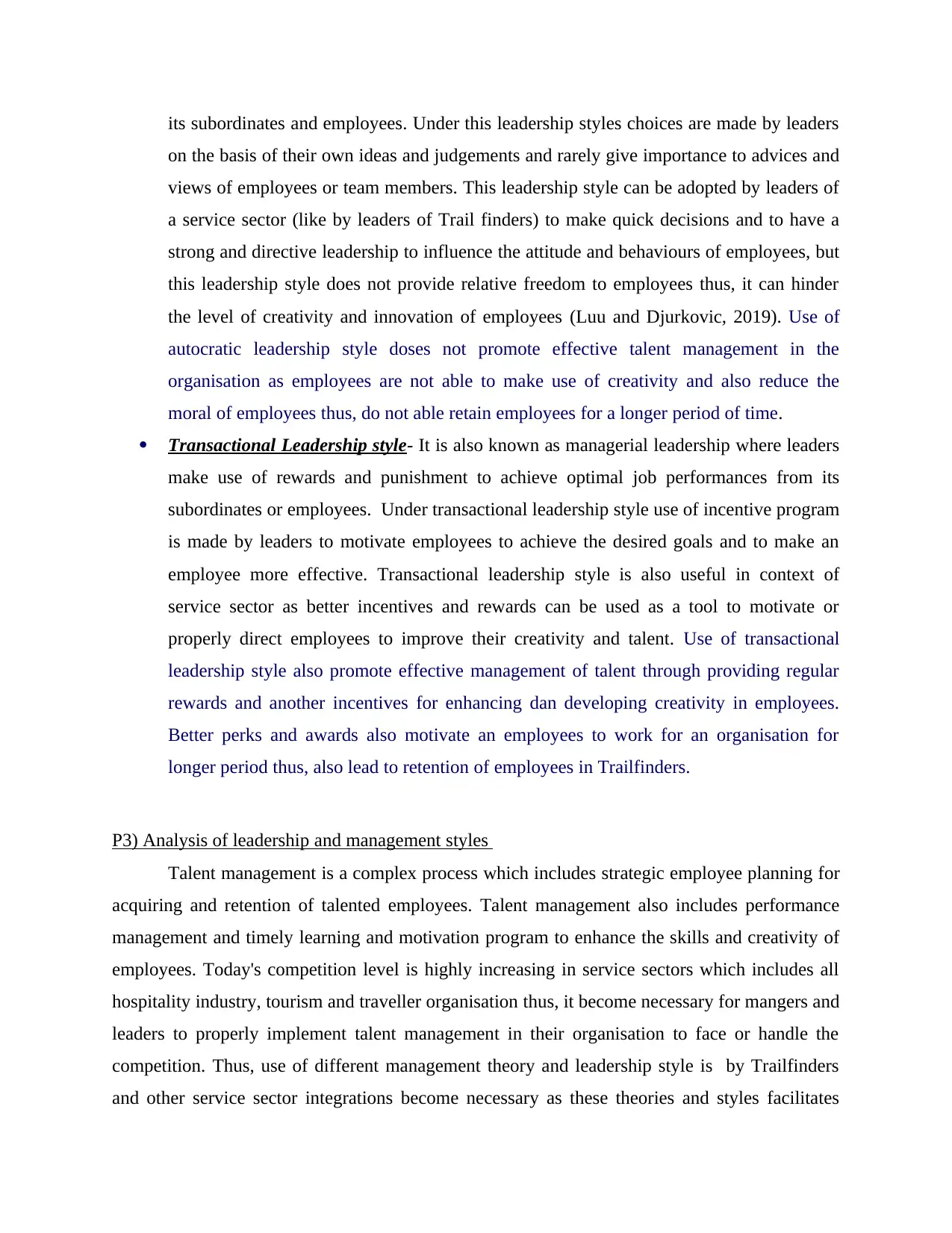
its subordinates and employees. Under this leadership styles choices are made by leaders
on the basis of their own ideas and judgements and rarely give importance to advices and
views of employees or team members. This leadership style can be adopted by leaders of
a service sector (like by leaders of Trail finders) to make quick decisions and to have a
strong and directive leadership to influence the attitude and behaviours of employees, but
this leadership style does not provide relative freedom to employees thus, it can hinder
the level of creativity and innovation of employees (Luu and Djurkovic, 2019). Use of
autocratic leadership style doses not promote effective talent management in the
organisation as employees are not able to make use of creativity and also reduce the
moral of employees thus, do not able retain employees for a longer period of time.
Transactional Leadership style- It is also known as managerial leadership where leaders
make use of rewards and punishment to achieve optimal job performances from its
subordinates or employees. Under transactional leadership style use of incentive program
is made by leaders to motivate employees to achieve the desired goals and to make an
employee more effective. Transactional leadership style is also useful in context of
service sector as better incentives and rewards can be used as a tool to motivate or
properly direct employees to improve their creativity and talent. Use of transactional
leadership style also promote effective management of talent through providing regular
rewards and another incentives for enhancing dan developing creativity in employees.
Better perks and awards also motivate an employees to work for an organisation for
longer period thus, also lead to retention of employees in Trailfinders.
P3) Analysis of leadership and management styles
Talent management is a complex process which includes strategic employee planning for
acquiring and retention of talented employees. Talent management also includes performance
management and timely learning and motivation program to enhance the skills and creativity of
employees. Today's competition level is highly increasing in service sectors which includes all
hospitality industry, tourism and traveller organisation thus, it become necessary for mangers and
leaders to properly implement talent management in their organisation to face or handle the
competition. Thus, use of different management theory and leadership style is by Trailfinders
and other service sector integrations become necessary as these theories and styles facilitates
on the basis of their own ideas and judgements and rarely give importance to advices and
views of employees or team members. This leadership style can be adopted by leaders of
a service sector (like by leaders of Trail finders) to make quick decisions and to have a
strong and directive leadership to influence the attitude and behaviours of employees, but
this leadership style does not provide relative freedom to employees thus, it can hinder
the level of creativity and innovation of employees (Luu and Djurkovic, 2019). Use of
autocratic leadership style doses not promote effective talent management in the
organisation as employees are not able to make use of creativity and also reduce the
moral of employees thus, do not able retain employees for a longer period of time.
Transactional Leadership style- It is also known as managerial leadership where leaders
make use of rewards and punishment to achieve optimal job performances from its
subordinates or employees. Under transactional leadership style use of incentive program
is made by leaders to motivate employees to achieve the desired goals and to make an
employee more effective. Transactional leadership style is also useful in context of
service sector as better incentives and rewards can be used as a tool to motivate or
properly direct employees to improve their creativity and talent. Use of transactional
leadership style also promote effective management of talent through providing regular
rewards and another incentives for enhancing dan developing creativity in employees.
Better perks and awards also motivate an employees to work for an organisation for
longer period thus, also lead to retention of employees in Trailfinders.
P3) Analysis of leadership and management styles
Talent management is a complex process which includes strategic employee planning for
acquiring and retention of talented employees. Talent management also includes performance
management and timely learning and motivation program to enhance the skills and creativity of
employees. Today's competition level is highly increasing in service sectors which includes all
hospitality industry, tourism and traveller organisation thus, it become necessary for mangers and
leaders to properly implement talent management in their organisation to face or handle the
competition. Thus, use of different management theory and leadership style is by Trailfinders
and other service sector integrations become necessary as these theories and styles facilitates
⊘ This is a preview!⊘
Do you want full access?
Subscribe today to unlock all pages.

Trusted by 1+ million students worldwide
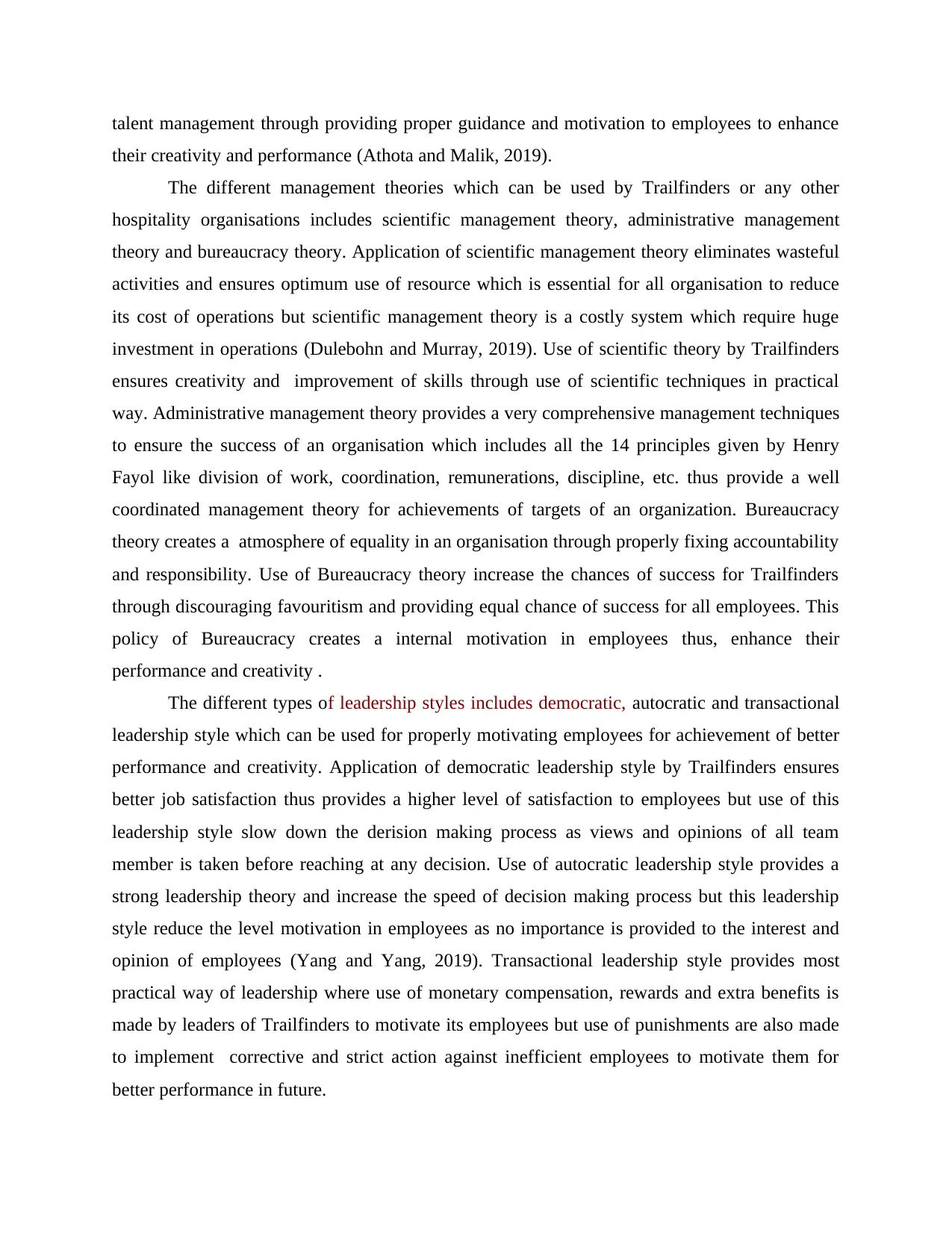
talent management through providing proper guidance and motivation to employees to enhance
their creativity and performance (Athota and Malik, 2019).
The different management theories which can be used by Trailfinders or any other
hospitality organisations includes scientific management theory, administrative management
theory and bureaucracy theory. Application of scientific management theory eliminates wasteful
activities and ensures optimum use of resource which is essential for all organisation to reduce
its cost of operations but scientific management theory is a costly system which require huge
investment in operations (Dulebohn and Murray, 2019). Use of scientific theory by Trailfinders
ensures creativity and improvement of skills through use of scientific techniques in practical
way. Administrative management theory provides a very comprehensive management techniques
to ensure the success of an organisation which includes all the 14 principles given by Henry
Fayol like division of work, coordination, remunerations, discipline, etc. thus provide a well
coordinated management theory for achievements of targets of an organization. Bureaucracy
theory creates a atmosphere of equality in an organisation through properly fixing accountability
and responsibility. Use of Bureaucracy theory increase the chances of success for Trailfinders
through discouraging favouritism and providing equal chance of success for all employees. This
policy of Bureaucracy creates a internal motivation in employees thus, enhance their
performance and creativity .
The different types of leadership styles includes democratic, autocratic and transactional
leadership style which can be used for properly motivating employees for achievement of better
performance and creativity. Application of democratic leadership style by Trailfinders ensures
better job satisfaction thus provides a higher level of satisfaction to employees but use of this
leadership style slow down the derision making process as views and opinions of all team
member is taken before reaching at any decision. Use of autocratic leadership style provides a
strong leadership theory and increase the speed of decision making process but this leadership
style reduce the level motivation in employees as no importance is provided to the interest and
opinion of employees (Yang and Yang, 2019). Transactional leadership style provides most
practical way of leadership where use of monetary compensation, rewards and extra benefits is
made by leaders of Trailfinders to motivate its employees but use of punishments are also made
to implement corrective and strict action against inefficient employees to motivate them for
better performance in future.
their creativity and performance (Athota and Malik, 2019).
The different management theories which can be used by Trailfinders or any other
hospitality organisations includes scientific management theory, administrative management
theory and bureaucracy theory. Application of scientific management theory eliminates wasteful
activities and ensures optimum use of resource which is essential for all organisation to reduce
its cost of operations but scientific management theory is a costly system which require huge
investment in operations (Dulebohn and Murray, 2019). Use of scientific theory by Trailfinders
ensures creativity and improvement of skills through use of scientific techniques in practical
way. Administrative management theory provides a very comprehensive management techniques
to ensure the success of an organisation which includes all the 14 principles given by Henry
Fayol like division of work, coordination, remunerations, discipline, etc. thus provide a well
coordinated management theory for achievements of targets of an organization. Bureaucracy
theory creates a atmosphere of equality in an organisation through properly fixing accountability
and responsibility. Use of Bureaucracy theory increase the chances of success for Trailfinders
through discouraging favouritism and providing equal chance of success for all employees. This
policy of Bureaucracy creates a internal motivation in employees thus, enhance their
performance and creativity .
The different types of leadership styles includes democratic, autocratic and transactional
leadership style which can be used for properly motivating employees for achievement of better
performance and creativity. Application of democratic leadership style by Trailfinders ensures
better job satisfaction thus provides a higher level of satisfaction to employees but use of this
leadership style slow down the derision making process as views and opinions of all team
member is taken before reaching at any decision. Use of autocratic leadership style provides a
strong leadership theory and increase the speed of decision making process but this leadership
style reduce the level motivation in employees as no importance is provided to the interest and
opinion of employees (Yang and Yang, 2019). Transactional leadership style provides most
practical way of leadership where use of monetary compensation, rewards and extra benefits is
made by leaders of Trailfinders to motivate its employees but use of punishments are also made
to implement corrective and strict action against inefficient employees to motivate them for
better performance in future.
Paraphrase This Document
Need a fresh take? Get an instant paraphrase of this document with our AI Paraphraser
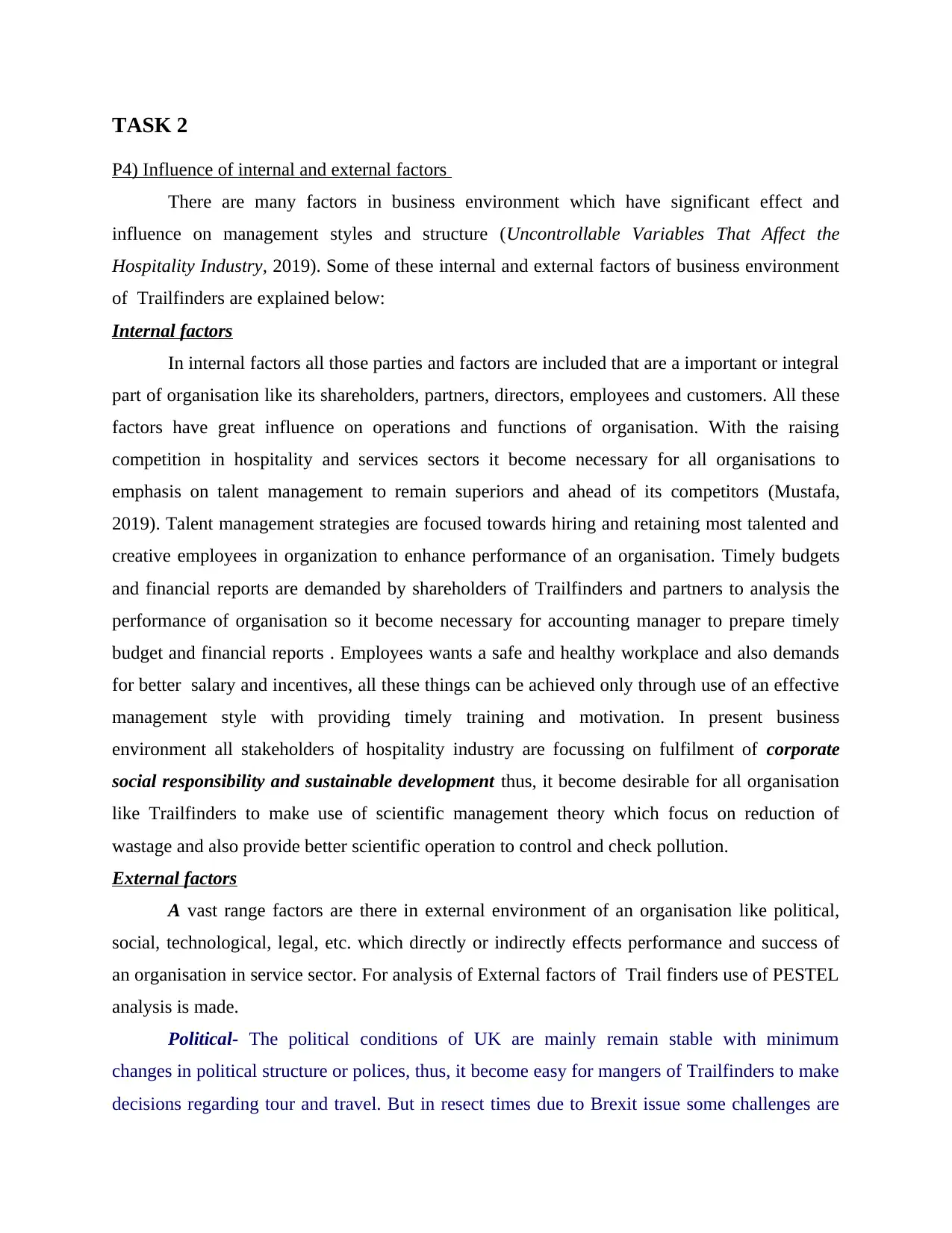
TASK 2
P4) Influence of internal and external factors
There are many factors in business environment which have significant effect and
influence on management styles and structure (Uncontrollable Variables That Affect the
Hospitality Industry, 2019). Some of these internal and external factors of business environment
of Trailfinders are explained below:
Internal factors
In internal factors all those parties and factors are included that are a important or integral
part of organisation like its shareholders, partners, directors, employees and customers. All these
factors have great influence on operations and functions of organisation. With the raising
competition in hospitality and services sectors it become necessary for all organisations to
emphasis on talent management to remain superiors and ahead of its competitors (Mustafa,
2019). Talent management strategies are focused towards hiring and retaining most talented and
creative employees in organization to enhance performance of an organisation. Timely budgets
and financial reports are demanded by shareholders of Trailfinders and partners to analysis the
performance of organisation so it become necessary for accounting manager to prepare timely
budget and financial reports . Employees wants a safe and healthy workplace and also demands
for better salary and incentives, all these things can be achieved only through use of an effective
management style with providing timely training and motivation. In present business
environment all stakeholders of hospitality industry are focussing on fulfilment of corporate
social responsibility and sustainable development thus, it become desirable for all organisation
like Trailfinders to make use of scientific management theory which focus on reduction of
wastage and also provide better scientific operation to control and check pollution.
External factors
A vast range factors are there in external environment of an organisation like political,
social, technological, legal, etc. which directly or indirectly effects performance and success of
an organisation in service sector. For analysis of External factors of Trail finders use of PESTEL
analysis is made.
Political- The political conditions of UK are mainly remain stable with minimum
changes in political structure or polices, thus, it become easy for mangers of Trailfinders to make
decisions regarding tour and travel. But in resect times due to Brexit issue some challenges are
P4) Influence of internal and external factors
There are many factors in business environment which have significant effect and
influence on management styles and structure (Uncontrollable Variables That Affect the
Hospitality Industry, 2019). Some of these internal and external factors of business environment
of Trailfinders are explained below:
Internal factors
In internal factors all those parties and factors are included that are a important or integral
part of organisation like its shareholders, partners, directors, employees and customers. All these
factors have great influence on operations and functions of organisation. With the raising
competition in hospitality and services sectors it become necessary for all organisations to
emphasis on talent management to remain superiors and ahead of its competitors (Mustafa,
2019). Talent management strategies are focused towards hiring and retaining most talented and
creative employees in organization to enhance performance of an organisation. Timely budgets
and financial reports are demanded by shareholders of Trailfinders and partners to analysis the
performance of organisation so it become necessary for accounting manager to prepare timely
budget and financial reports . Employees wants a safe and healthy workplace and also demands
for better salary and incentives, all these things can be achieved only through use of an effective
management style with providing timely training and motivation. In present business
environment all stakeholders of hospitality industry are focussing on fulfilment of corporate
social responsibility and sustainable development thus, it become desirable for all organisation
like Trailfinders to make use of scientific management theory which focus on reduction of
wastage and also provide better scientific operation to control and check pollution.
External factors
A vast range factors are there in external environment of an organisation like political,
social, technological, legal, etc. which directly or indirectly effects performance and success of
an organisation in service sector. For analysis of External factors of Trail finders use of PESTEL
analysis is made.
Political- The political conditions of UK are mainly remain stable with minimum
changes in political structure or polices, thus, it become easy for mangers of Trailfinders to make
decisions regarding tour and travel. But in resect times due to Brexit issue some challenges are
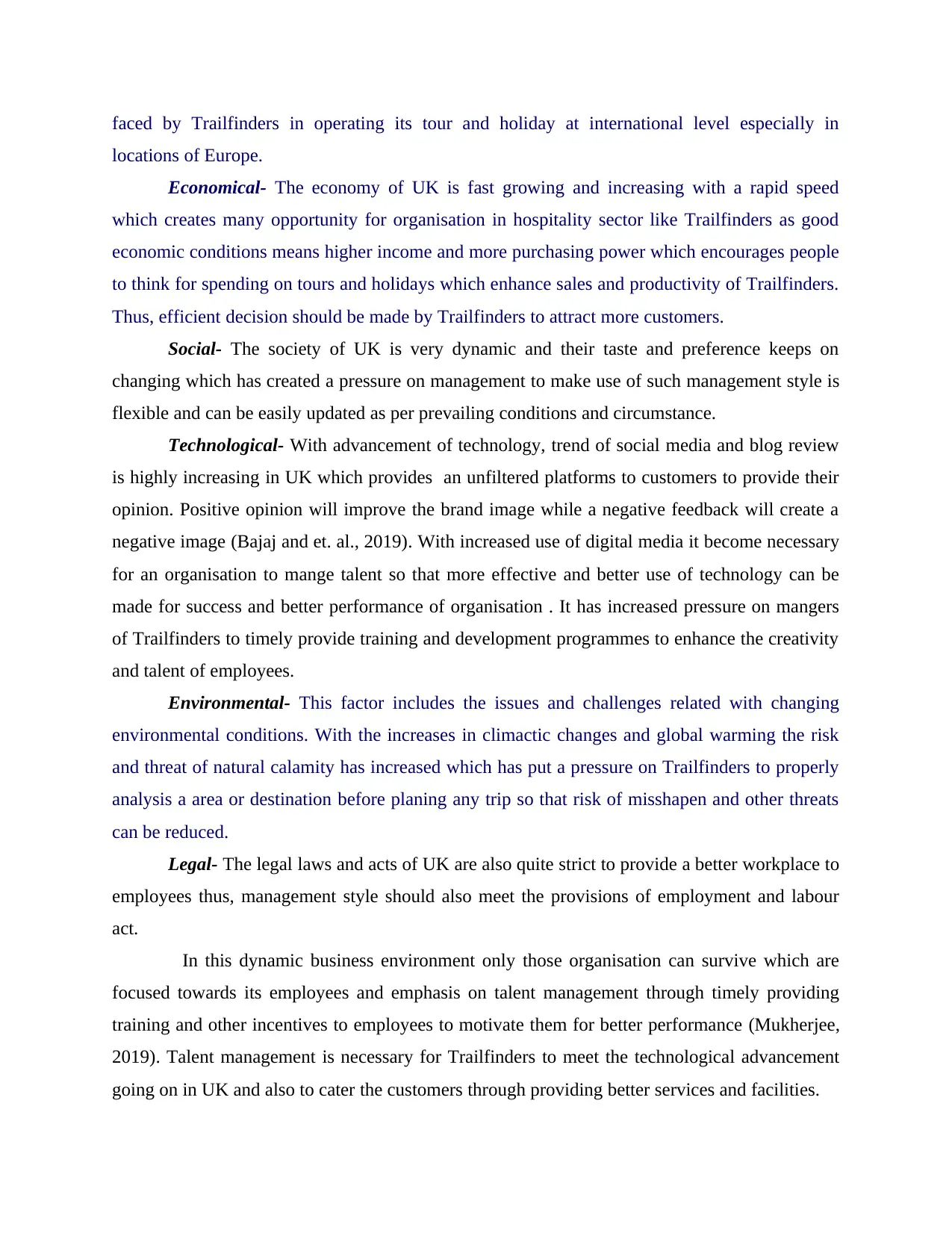
faced by Trailfinders in operating its tour and holiday at international level especially in
locations of Europe.
Economical- The economy of UK is fast growing and increasing with a rapid speed
which creates many opportunity for organisation in hospitality sector like Trailfinders as good
economic conditions means higher income and more purchasing power which encourages people
to think for spending on tours and holidays which enhance sales and productivity of Trailfinders.
Thus, efficient decision should be made by Trailfinders to attract more customers.
Social- The society of UK is very dynamic and their taste and preference keeps on
changing which has created a pressure on management to make use of such management style is
flexible and can be easily updated as per prevailing conditions and circumstance.
Technological- With advancement of technology, trend of social media and blog review
is highly increasing in UK which provides an unfiltered platforms to customers to provide their
opinion. Positive opinion will improve the brand image while a negative feedback will create a
negative image (Bajaj and et. al., 2019). With increased use of digital media it become necessary
for an organisation to mange talent so that more effective and better use of technology can be
made for success and better performance of organisation . It has increased pressure on mangers
of Trailfinders to timely provide training and development programmes to enhance the creativity
and talent of employees.
Environmental- This factor includes the issues and challenges related with changing
environmental conditions. With the increases in climactic changes and global warming the risk
and threat of natural calamity has increased which has put a pressure on Trailfinders to properly
analysis a area or destination before planing any trip so that risk of misshapen and other threats
can be reduced.
Legal- The legal laws and acts of UK are also quite strict to provide a better workplace to
employees thus, management style should also meet the provisions of employment and labour
act.
In this dynamic business environment only those organisation can survive which are
focused towards its employees and emphasis on talent management through timely providing
training and other incentives to employees to motivate them for better performance (Mukherjee,
2019). Talent management is necessary for Trailfinders to meet the technological advancement
going on in UK and also to cater the customers through providing better services and facilities.
locations of Europe.
Economical- The economy of UK is fast growing and increasing with a rapid speed
which creates many opportunity for organisation in hospitality sector like Trailfinders as good
economic conditions means higher income and more purchasing power which encourages people
to think for spending on tours and holidays which enhance sales and productivity of Trailfinders.
Thus, efficient decision should be made by Trailfinders to attract more customers.
Social- The society of UK is very dynamic and their taste and preference keeps on
changing which has created a pressure on management to make use of such management style is
flexible and can be easily updated as per prevailing conditions and circumstance.
Technological- With advancement of technology, trend of social media and blog review
is highly increasing in UK which provides an unfiltered platforms to customers to provide their
opinion. Positive opinion will improve the brand image while a negative feedback will create a
negative image (Bajaj and et. al., 2019). With increased use of digital media it become necessary
for an organisation to mange talent so that more effective and better use of technology can be
made for success and better performance of organisation . It has increased pressure on mangers
of Trailfinders to timely provide training and development programmes to enhance the creativity
and talent of employees.
Environmental- This factor includes the issues and challenges related with changing
environmental conditions. With the increases in climactic changes and global warming the risk
and threat of natural calamity has increased which has put a pressure on Trailfinders to properly
analysis a area or destination before planing any trip so that risk of misshapen and other threats
can be reduced.
Legal- The legal laws and acts of UK are also quite strict to provide a better workplace to
employees thus, management style should also meet the provisions of employment and labour
act.
In this dynamic business environment only those organisation can survive which are
focused towards its employees and emphasis on talent management through timely providing
training and other incentives to employees to motivate them for better performance (Mukherjee,
2019). Talent management is necessary for Trailfinders to meet the technological advancement
going on in UK and also to cater the customers through providing better services and facilities.
⊘ This is a preview!⊘
Do you want full access?
Subscribe today to unlock all pages.

Trusted by 1+ million students worldwide
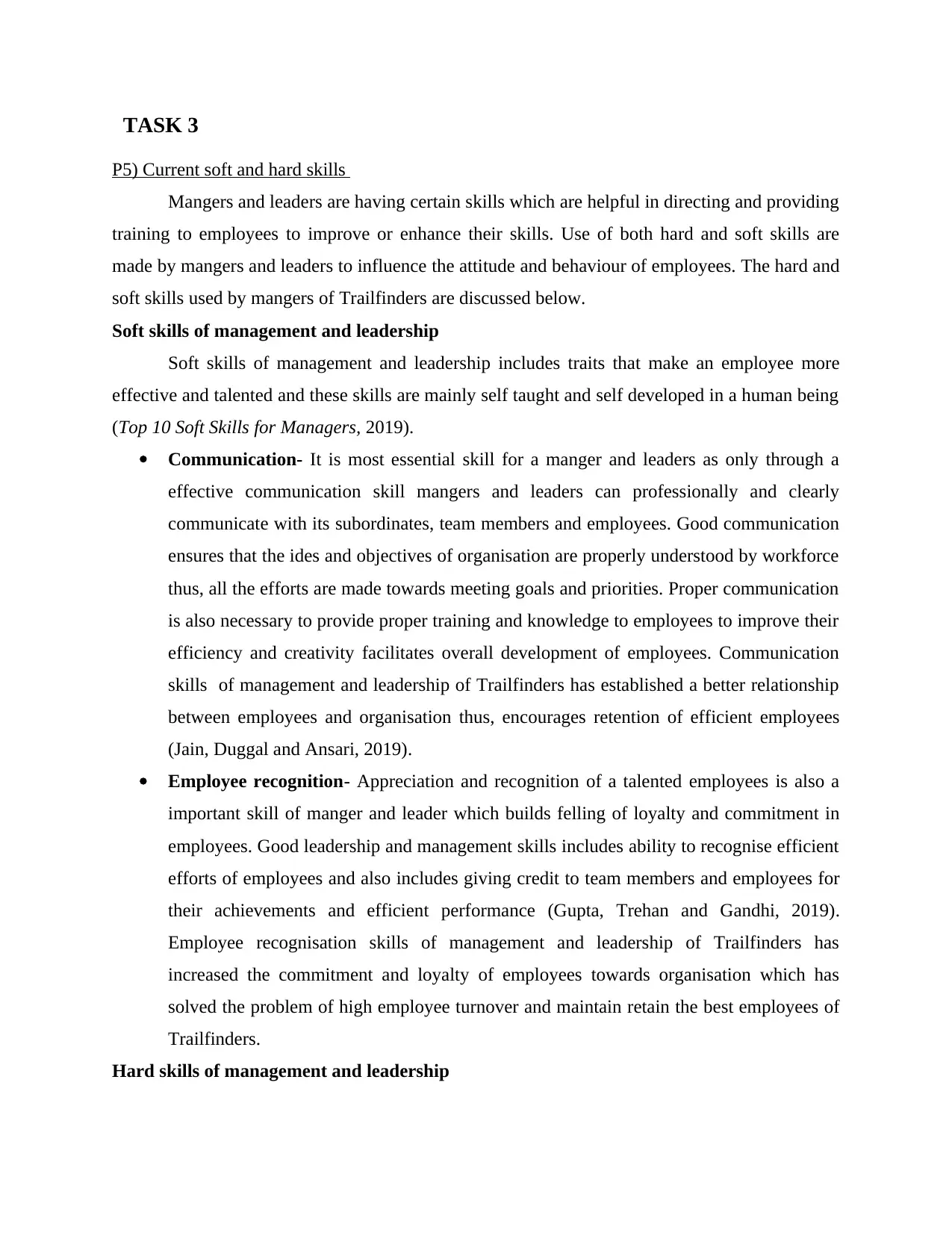
TASK 3
P5) Current soft and hard skills
Mangers and leaders are having certain skills which are helpful in directing and providing
training to employees to improve or enhance their skills. Use of both hard and soft skills are
made by mangers and leaders to influence the attitude and behaviour of employees. The hard and
soft skills used by mangers of Trailfinders are discussed below.
Soft skills of management and leadership
Soft skills of management and leadership includes traits that make an employee more
effective and talented and these skills are mainly self taught and self developed in a human being
(Top 10 Soft Skills for Managers, 2019).
Communication- It is most essential skill for a manger and leaders as only through a
effective communication skill mangers and leaders can professionally and clearly
communicate with its subordinates, team members and employees. Good communication
ensures that the ides and objectives of organisation are properly understood by workforce
thus, all the efforts are made towards meeting goals and priorities. Proper communication
is also necessary to provide proper training and knowledge to employees to improve their
efficiency and creativity facilitates overall development of employees. Communication
skills of management and leadership of Trailfinders has established a better relationship
between employees and organisation thus, encourages retention of efficient employees
(Jain, Duggal and Ansari, 2019).
Employee recognition- Appreciation and recognition of a talented employees is also a
important skill of manger and leader which builds felling of loyalty and commitment in
employees. Good leadership and management skills includes ability to recognise efficient
efforts of employees and also includes giving credit to team members and employees for
their achievements and efficient performance (Gupta, Trehan and Gandhi, 2019).
Employee recognisation skills of management and leadership of Trailfinders has
increased the commitment and loyalty of employees towards organisation which has
solved the problem of high employee turnover and maintain retain the best employees of
Trailfinders.
Hard skills of management and leadership
P5) Current soft and hard skills
Mangers and leaders are having certain skills which are helpful in directing and providing
training to employees to improve or enhance their skills. Use of both hard and soft skills are
made by mangers and leaders to influence the attitude and behaviour of employees. The hard and
soft skills used by mangers of Trailfinders are discussed below.
Soft skills of management and leadership
Soft skills of management and leadership includes traits that make an employee more
effective and talented and these skills are mainly self taught and self developed in a human being
(Top 10 Soft Skills for Managers, 2019).
Communication- It is most essential skill for a manger and leaders as only through a
effective communication skill mangers and leaders can professionally and clearly
communicate with its subordinates, team members and employees. Good communication
ensures that the ides and objectives of organisation are properly understood by workforce
thus, all the efforts are made towards meeting goals and priorities. Proper communication
is also necessary to provide proper training and knowledge to employees to improve their
efficiency and creativity facilitates overall development of employees. Communication
skills of management and leadership of Trailfinders has established a better relationship
between employees and organisation thus, encourages retention of efficient employees
(Jain, Duggal and Ansari, 2019).
Employee recognition- Appreciation and recognition of a talented employees is also a
important skill of manger and leader which builds felling of loyalty and commitment in
employees. Good leadership and management skills includes ability to recognise efficient
efforts of employees and also includes giving credit to team members and employees for
their achievements and efficient performance (Gupta, Trehan and Gandhi, 2019).
Employee recognisation skills of management and leadership of Trailfinders has
increased the commitment and loyalty of employees towards organisation which has
solved the problem of high employee turnover and maintain retain the best employees of
Trailfinders.
Hard skills of management and leadership
Paraphrase This Document
Need a fresh take? Get an instant paraphrase of this document with our AI Paraphraser
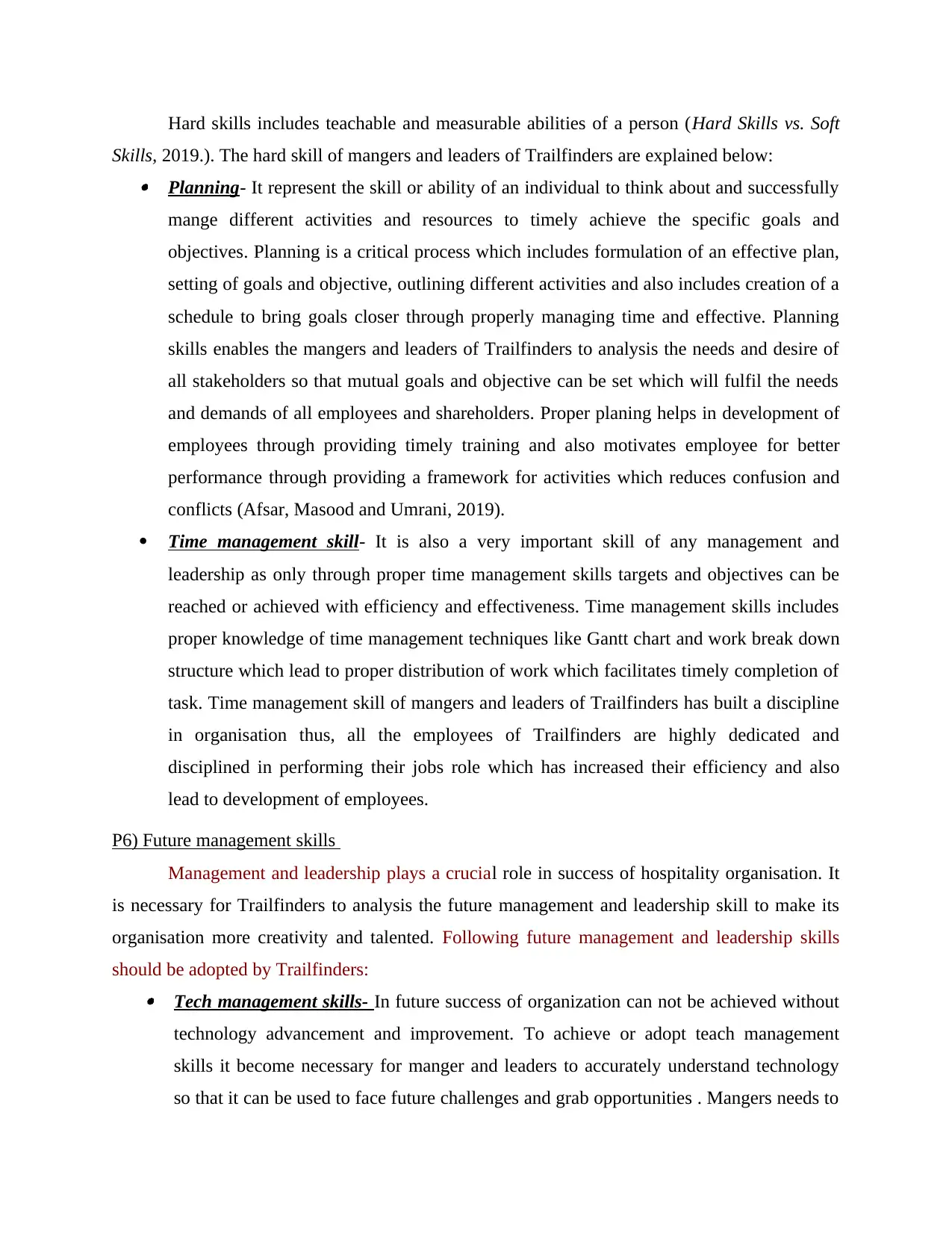
Hard skills includes teachable and measurable abilities of a person (Hard Skills vs. Soft
Skills, 2019.). The hard skill of mangers and leaders of Trailfinders are explained below: Planning- It represent the skill or ability of an individual to think about and successfully
mange different activities and resources to timely achieve the specific goals and
objectives. Planning is a critical process which includes formulation of an effective plan,
setting of goals and objective, outlining different activities and also includes creation of a
schedule to bring goals closer through properly managing time and effective. Planning
skills enables the mangers and leaders of Trailfinders to analysis the needs and desire of
all stakeholders so that mutual goals and objective can be set which will fulfil the needs
and demands of all employees and shareholders. Proper planing helps in development of
employees through providing timely training and also motivates employee for better
performance through providing a framework for activities which reduces confusion and
conflicts (Afsar, Masood and Umrani, 2019).
Time management skill- It is also a very important skill of any management and
leadership as only through proper time management skills targets and objectives can be
reached or achieved with efficiency and effectiveness. Time management skills includes
proper knowledge of time management techniques like Gantt chart and work break down
structure which lead to proper distribution of work which facilitates timely completion of
task. Time management skill of mangers and leaders of Trailfinders has built a discipline
in organisation thus, all the employees of Trailfinders are highly dedicated and
disciplined in performing their jobs role which has increased their efficiency and also
lead to development of employees.
P6) Future management skills
Management and leadership plays a crucial role in success of hospitality organisation. It
is necessary for Trailfinders to analysis the future management and leadership skill to make its
organisation more creativity and talented. Following future management and leadership skills
should be adopted by Trailfinders: Tech management skills- In future success of organization can not be achieved without
technology advancement and improvement. To achieve or adopt teach management
skills it become necessary for manger and leaders to accurately understand technology
so that it can be used to face future challenges and grab opportunities . Mangers needs to
Skills, 2019.). The hard skill of mangers and leaders of Trailfinders are explained below: Planning- It represent the skill or ability of an individual to think about and successfully
mange different activities and resources to timely achieve the specific goals and
objectives. Planning is a critical process which includes formulation of an effective plan,
setting of goals and objective, outlining different activities and also includes creation of a
schedule to bring goals closer through properly managing time and effective. Planning
skills enables the mangers and leaders of Trailfinders to analysis the needs and desire of
all stakeholders so that mutual goals and objective can be set which will fulfil the needs
and demands of all employees and shareholders. Proper planing helps in development of
employees through providing timely training and also motivates employee for better
performance through providing a framework for activities which reduces confusion and
conflicts (Afsar, Masood and Umrani, 2019).
Time management skill- It is also a very important skill of any management and
leadership as only through proper time management skills targets and objectives can be
reached or achieved with efficiency and effectiveness. Time management skills includes
proper knowledge of time management techniques like Gantt chart and work break down
structure which lead to proper distribution of work which facilitates timely completion of
task. Time management skill of mangers and leaders of Trailfinders has built a discipline
in organisation thus, all the employees of Trailfinders are highly dedicated and
disciplined in performing their jobs role which has increased their efficiency and also
lead to development of employees.
P6) Future management skills
Management and leadership plays a crucial role in success of hospitality organisation. It
is necessary for Trailfinders to analysis the future management and leadership skill to make its
organisation more creativity and talented. Following future management and leadership skills
should be adopted by Trailfinders: Tech management skills- In future success of organization can not be achieved without
technology advancement and improvement. To achieve or adopt teach management
skills it become necessary for manger and leaders to accurately understand technology
so that it can be used to face future challenges and grab opportunities . Mangers needs to
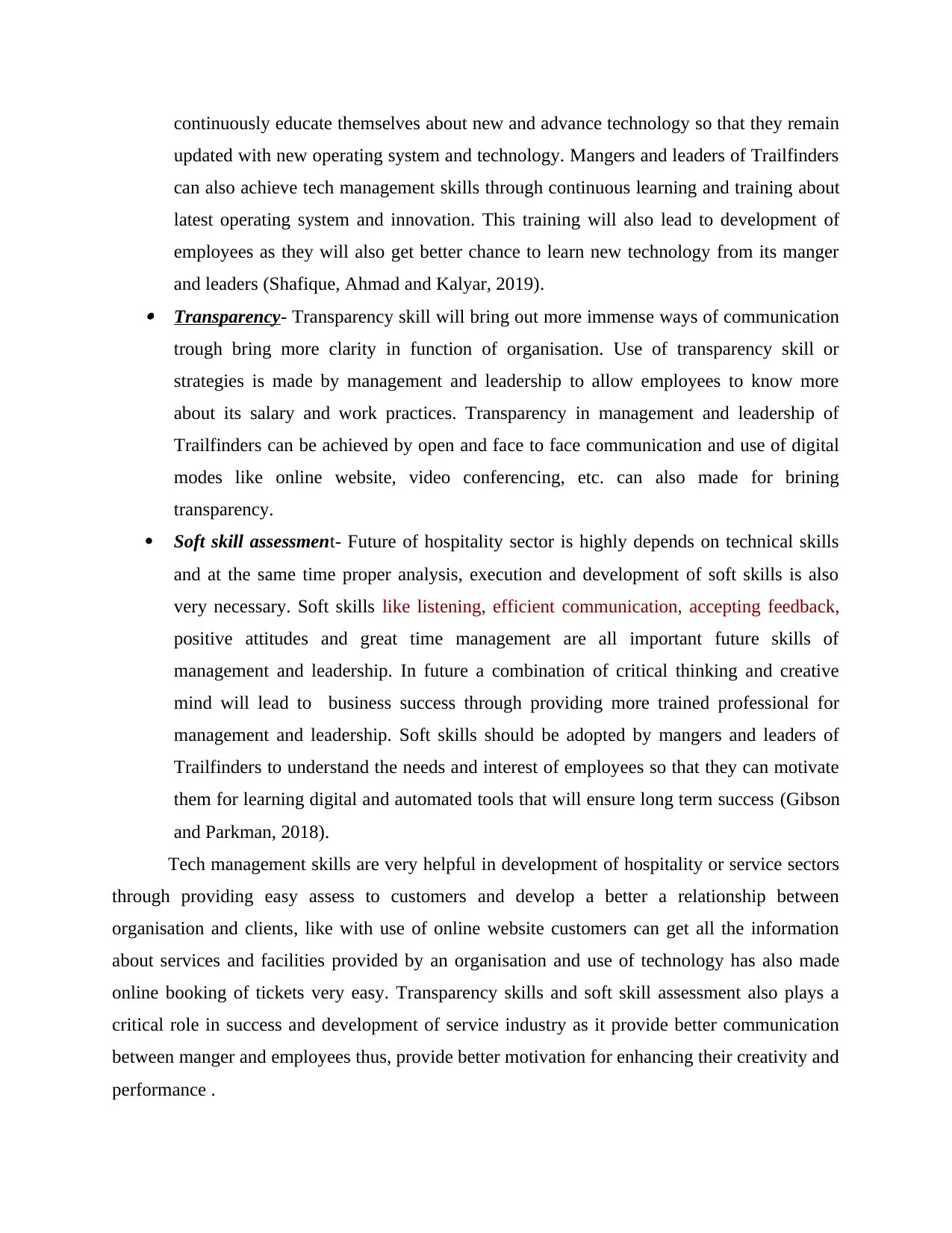
continuously educate themselves about new and advance technology so that they remain
updated with new operating system and technology. Mangers and leaders of Trailfinders
can also achieve tech management skills through continuous learning and training about
latest operating system and innovation. This training will also lead to development of
employees as they will also get better chance to learn new technology from its manger
and leaders (Shafique, Ahmad and Kalyar, 2019). Transparency- Transparency skill will bring out more immense ways of communication
trough bring more clarity in function of organisation. Use of transparency skill or
strategies is made by management and leadership to allow employees to know more
about its salary and work practices. Transparency in management and leadership of
Trailfinders can be achieved by open and face to face communication and use of digital
modes like online website, video conferencing, etc. can also made for brining
transparency.
Soft skill assessment- Future of hospitality sector is highly depends on technical skills
and at the same time proper analysis, execution and development of soft skills is also
very necessary. Soft skills like listening, efficient communication, accepting feedback,
positive attitudes and great time management are all important future skills of
management and leadership. In future a combination of critical thinking and creative
mind will lead to business success through providing more trained professional for
management and leadership. Soft skills should be adopted by mangers and leaders of
Trailfinders to understand the needs and interest of employees so that they can motivate
them for learning digital and automated tools that will ensure long term success (Gibson
and Parkman, 2018).
Tech management skills are very helpful in development of hospitality or service sectors
through providing easy assess to customers and develop a better a relationship between
organisation and clients, like with use of online website customers can get all the information
about services and facilities provided by an organisation and use of technology has also made
online booking of tickets very easy. Transparency skills and soft skill assessment also plays a
critical role in success and development of service industry as it provide better communication
between manger and employees thus, provide better motivation for enhancing their creativity and
performance .
updated with new operating system and technology. Mangers and leaders of Trailfinders
can also achieve tech management skills through continuous learning and training about
latest operating system and innovation. This training will also lead to development of
employees as they will also get better chance to learn new technology from its manger
and leaders (Shafique, Ahmad and Kalyar, 2019). Transparency- Transparency skill will bring out more immense ways of communication
trough bring more clarity in function of organisation. Use of transparency skill or
strategies is made by management and leadership to allow employees to know more
about its salary and work practices. Transparency in management and leadership of
Trailfinders can be achieved by open and face to face communication and use of digital
modes like online website, video conferencing, etc. can also made for brining
transparency.
Soft skill assessment- Future of hospitality sector is highly depends on technical skills
and at the same time proper analysis, execution and development of soft skills is also
very necessary. Soft skills like listening, efficient communication, accepting feedback,
positive attitudes and great time management are all important future skills of
management and leadership. In future a combination of critical thinking and creative
mind will lead to business success through providing more trained professional for
management and leadership. Soft skills should be adopted by mangers and leaders of
Trailfinders to understand the needs and interest of employees so that they can motivate
them for learning digital and automated tools that will ensure long term success (Gibson
and Parkman, 2018).
Tech management skills are very helpful in development of hospitality or service sectors
through providing easy assess to customers and develop a better a relationship between
organisation and clients, like with use of online website customers can get all the information
about services and facilities provided by an organisation and use of technology has also made
online booking of tickets very easy. Transparency skills and soft skill assessment also plays a
critical role in success and development of service industry as it provide better communication
between manger and employees thus, provide better motivation for enhancing their creativity and
performance .
⊘ This is a preview!⊘
Do you want full access?
Subscribe today to unlock all pages.

Trusted by 1+ million students worldwide
1 out of 17
Related Documents
Your All-in-One AI-Powered Toolkit for Academic Success.
+13062052269
info@desklib.com
Available 24*7 on WhatsApp / Email
![[object Object]](/_next/static/media/star-bottom.7253800d.svg)
Unlock your academic potential
Copyright © 2020–2026 A2Z Services. All Rights Reserved. Developed and managed by ZUCOL.



